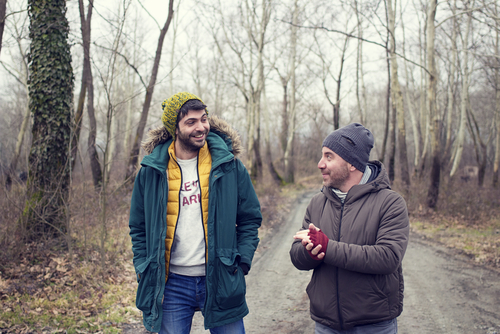
In our previous two QA articles, we discussed SAD, seasonal affect disorder, and trauma. First, we talked about what SAD is and how it can relate to trauma. Second, we looked at the intricacies of how the experience of SAD can trigger trauma, then, how we can start to cope with SAD by talking with our trauma therapist to unravel the story. Here, we will discuss some of the proven ways to practice self-care during an episode of SAD, especially when trauma is being triggered.
Get Sunlight Where You Can
One of the greatest challenges with SAD is feeling overly tired, low energy, depressed, and lethargic. The lack of sunshine due to limited daylight hours and sometimes cloudier, rainier weather takes a serious toll on our mental health. Our bodies need Vitamin D, produced by the sun. To maximize our Vitamin D intake, we can take high concentration supplements every single day, but the real sunshine outside is what we need most. When we know we will have a sunny day, we need to maximize our time in the sun. If we can’t work outside or spend a great deal of time outside, we can make sure to get outside into the sunshine as much as possible. We can take walks, exercise, take phone calls in the sunshine, take our lunch break in the sunshine, and get ourselves in direct sunlight wherever possible.
Keep Your Energy Up In The Afternoon
Some of the exhaustion caused by SAD happens as a result of melatonin, a brain chemical which helps the body and mind prepare for sleep, producing earlier in the day since the sun sets earlier in the winter. Like any other day, there is a slump in the afternoon where energy tends to wane. During the winter, that slump can come even earlier in the day. Anticipating a greater, earlier drop in energy, we can pack healthy energizing snacks, plan a ten minute cardio movement which boosts our heart rate, or plan something which keeps our spirits up like watching something funny, doing a meditation, talking to a sponsor, mentor, or friend, and any other activity which keeps us motivated.
Take Care Of Yourself
Depression and symptoms similar to depression ask us to slow down, feel deeply, and connect with ourselves inside. Sometimes, it helps to acknowledge and fulfill the needs of our moods. Winter is full of themes of hibernation. Our self-care can include hunkering down and taking care of ourselves in a way we don’t during the sunnier, outside inspired months of the year. Self-care looks differently for everyone, but we can attend to our physical needs, clean our home, start a creative project, read books we’ve been meaning to read, or watch movies and TV which inspire our recovery.
Talk With Your Therapist
If your feelings of depression or emotional exhaustion due to SAD aren’t manageable through self-care and you are struggling to cope with the way SAD is triggering your trauma, it is time to talk with your therapist or with a professional. Likely, there is something beneath the service which needs deep love, compassion, and healing which you may not be able to find or provide for yourself. Thankfully, there are trauma treatment programs and amazing trauma therapists who can help you unravel your story even further and find the peace you need to live a happy, healthy life, every season of the year.
If you or someone you know has struggled immensely with trauma, help is available. Call The Guest House Ocala today for information on our residential treatment programs for trauma, addiction, and related mental health issues. 1-855-483-7800